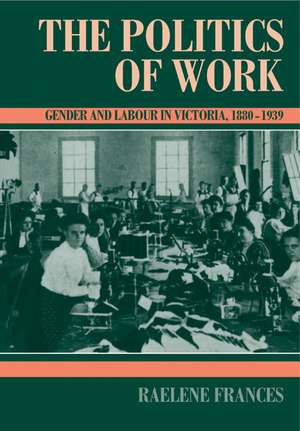The Politics of Work: Gender and Labour in Victoria, 1880–1939: Studies in Australian History
Autor Raelene Francesen Limba Engleză Paperback – 22 noi 1993
Din seria Studies in Australian History
-
 Preț: 288.25 lei
Preț: 288.25 lei -
 Preț: 308.77 lei
Preț: 308.77 lei -
 Preț: 433.31 lei
Preț: 433.31 lei -
 Preț: 418.12 lei
Preț: 418.12 lei -
 Preț: 237.93 lei
Preț: 237.93 lei -
 Preț: 295.08 lei
Preț: 295.08 lei -
 Preț: 385.67 lei
Preț: 385.67 lei -
 Preț: 329.32 lei
Preț: 329.32 lei -
 Preț: 207.65 lei
Preț: 207.65 lei -
 Preț: 414.26 lei
Preț: 414.26 lei - 11%
 Preț: 446.04 lei
Preț: 446.04 lei -
 Preț: 414.46 lei
Preț: 414.46 lei -
 Preț: 230.13 lei
Preț: 230.13 lei -
 Preț: 371.99 lei
Preț: 371.99 lei -
 Preț: 302.03 lei
Preț: 302.03 lei -
 Preț: 332.71 lei
Preț: 332.71 lei - 11%
 Preț: 606.30 lei
Preț: 606.30 lei -
 Preț: 288.04 lei
Preț: 288.04 lei -
 Preț: 254.65 lei
Preț: 254.65 lei -
 Preț: 238.72 lei
Preț: 238.72 lei -
 Preț: 284.78 lei
Preț: 284.78 lei -
 Preț: 294.32 lei
Preț: 294.32 lei -
 Preț: 346.99 lei
Preț: 346.99 lei -
 Preț: 335.04 lei
Preț: 335.04 lei -
 Preț: 213.05 lei
Preț: 213.05 lei
Preț: 293.93 lei
Nou
Puncte Express: 441
Preț estimativ în valută:
56.24€ • 58.73$ • 46.44£
56.24€ • 58.73$ • 46.44£
Carte tipărită la comandă
Livrare economică 15-29 aprilie
Preluare comenzi: 021 569.72.76
Specificații
ISBN-13: 9780521457729
ISBN-10: 0521457726
Pagini: 280
Dimensiuni: 170 x 244 x 15 mm
Greutate: 0.45 kg
Ediția:Revised
Editura: Cambridge University Press
Colecția Cambridge University Press
Seria Studies in Australian History
Locul publicării:Melbourne, Australia
ISBN-10: 0521457726
Pagini: 280
Dimensiuni: 170 x 244 x 15 mm
Greutate: 0.45 kg
Ediția:Revised
Editura: Cambridge University Press
Colecția Cambridge University Press
Seria Studies in Australian History
Locul publicării:Melbourne, Australia
Cuprins
Abbreviations; Acknowledgements; Introduction; Part I. Before the Wages Boards: Introduction; 1. 'The advent of machines and women': the clothing industries 1880–1896; 2. 'An age of grim adversity': the boot industry 1880–1896; 3. Drawing the line: the printing industries 1880–1900; Part II. The Wages Board Era: Introduction; 4. 'No more Amazons': the clothing industries, 1897–1919; 5. The workers baffled: the boot industry, 1897–1910; 6. Educating the girls: the printing industries, 1901–1925; Part III. The Era of Federal Wage Fixing: Introduction; 7. Diplomacy and guerilla warfare: the clothing industries, 1919–1939; 8. The Cinderella of the skilled trades: the boot industry, 1911–1939; 9. Marginal matters: the printing industry, 1925–1937; Conclusion; Bibliography.
Recenzii
"The data base is impressive in terms of its extent and its blend of quantitative and non-quantitative material, revealing an immense amount of hands-on work. Even more impressive is the way the author comes to grips with it. She promises, and achieves, a multi-faceted explanation of change in the labour process, encompassing the interaction between product and labour markets, technological advances, supply of capital, state interventions and racial and gender orders." Alison Turtle, Journal of the History of the Behavioral Sciences
"...does much to explain how 'skill' has been gendered historically and how women have come to occupy an inferior position in the capitalist labour market." Christina Burr, Labor History
"Frances' examination of three industries--clothing, boot-making and printing--is both thought-provoking and readable....[S]he is very persuasive in tracing the effects, which often are shown to be unpredictable or counter-productive, of technology and government intervention upon the conditions of work." Thomas E. Tausky, Australian and New Zealand Studies in Canada
"She ably demonstrates the importance of perceiving uneven developement with regard to gender and labor and of avoiding monocausal explanations of both change and the maintenance of the status quo....Frances's book makes a useful contribution to a more nuanced understanding of women's labor history." Judith Allen, American Historical Review
"...does much to explain how 'skill' has been gendered historically and how women have come to occupy an inferior position in the capitalist labour market." Christina Burr, Labor History
"Frances' examination of three industries--clothing, boot-making and printing--is both thought-provoking and readable....[S]he is very persuasive in tracing the effects, which often are shown to be unpredictable or counter-productive, of technology and government intervention upon the conditions of work." Thomas E. Tausky, Australian and New Zealand Studies in Canada
"She ably demonstrates the importance of perceiving uneven developement with regard to gender and labor and of avoiding monocausal explanations of both change and the maintenance of the status quo....Frances's book makes a useful contribution to a more nuanced understanding of women's labor history." Judith Allen, American Historical Review
Descriere
This book focuses on the workplace in Australia to look at how and why the nature of work changed during the period from the late nineteenth century to World War II.














